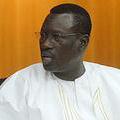 「國際排放權交易組織」上週日前在卡達舉行第一屆全非碳論壇,該會議旨在幫助非洲國家,在實施京都議定書中「清潔發展機制」下的溫室氣體減排計劃時,能獲得公正的對待,同時也希望能促進非洲國家對碳市場的興趣。
「國際排放權交易組織」上週日前在卡達舉行第一屆全非碳論壇,該會議旨在幫助非洲國家,在實施京都議定書中「清潔發展機制」下的溫室氣體減排計劃時,能獲得公正的對待,同時也希望能促進非洲國家對碳市場的興趣。
這個組織正在建立一個極積的全球性溫室效應氣體市場,企圖跨越國界發展出京都議定書中所規範的各類型的彈性措施──包括了「清潔發展機制」(Clean Development Mechanism,簡稱CDM)、「共同減量」(Joint Implementation,簡稱JI)和「排放權交易」。
所謂「清潔發展機制」,是指運用替代能源、節能設施或種樹等計畫,減少溫室氣體排放並同時促進永續發展。投資清潔發展計畫者,能獲得可交易的「認證減排額度」(certified emission reduction credits, CERs)。簽署京都議定的國家,也可以運用「認證減排額度」來履行其部份減量責任。
與會的人員在會中討論的議題包括:非洲的財務障礙、非洲自願性碳市場的重要性、能源效率、以及「認證減排額度」的財務和計價議題。而到了晚上,與會人員則探索各種潛在的合作機會。
聯合國首席氣候變遷官員德包爾表示:「要對抗氣候變遷,需要政治意願,而且需要大量的投資。像清潔發展機制,是刺激投資非常重要的工具。所以我們樂見藉由像非洲碳論壇的活動,讓非洲得到公私立機構的注意。」
聯合國環境規劃署(UNEP)環境法和公約部門主任肯特(Bakary Kante)則表示:「目前已存在許多作法,得以取得非洲『清潔發展機制』的利益。我們首要工作,是要讓世人認識到這類的機制是存在的,然後再藉由『能力建構』(capacity building)和公私部門的網路──如非洲碳論壇等活動,來排除世人參與的障礙。」
要暸解京都議定書規範下的各類彈性機制,如清潔發展機制、共同減量、和排放權交易等,請點這裡。
To help Africa obtain its fair share of climate emissions reduction projects under the Kyoto Protocol's Clean Development Mechanism and satisfy a growing interest in a carbon market on the continent, the International Emissions Trading Association on Wednesday launched the first all Africa Carbon Forum in Dakar.
The association is developing an active, global greenhouse gas market, consistent across national boundaries and involving all flexibility mechanisms under the Kyoto Protocol - the Clean Development Mechanism, Joint Implementation and emissions trading.
Under the Clean Development Mechanism, projects that reduce greenhouse gas emissions and contribute to sustainable development, such as renewable energy, energy efficiency or tree planting, can earn saleable certified emission reduction credits, CERs. Countries with commitments under the Kyoto Protocol to reduce their emissions can use the CERs to meet part of those obligations.
Forum participants attended sessions addressing financing barriers in Africa, the significance of voluntary carbon markets for Africa, energy efficiency, and project financing and pricing of CERs. In the evening, participants explored matchmaking opportunities.
"Combating climate change will take political will, and it will take a great deal of investment. Mechanisms like the CDM are an important means to stimulate that investment, so it's good to see that Africa is now getting the attention it deserves from the private sector and public sector through events like the Africa Carbon Forum," said de Boer, the UN's top climate change official.
Bakary Kante, director of the UN Environment Programme's Division of Environmental Law and Conventions, said, "A lot of work is being done to capture the benefits of the CDM in Africa. First and foremost we have to make people aware that this mechanism exists, then remove the barriers to participation through capacity building and private-public sector networking, at events like the Africa Carbon Forum."
For more on the flexibility mechanisms under the Kyoto Protocol - the Clean Development Mechanism, Joint Implementation and emissions trading - click here.






